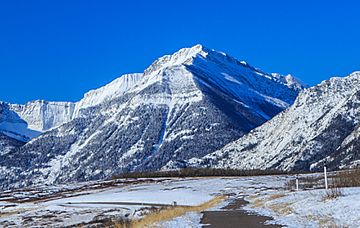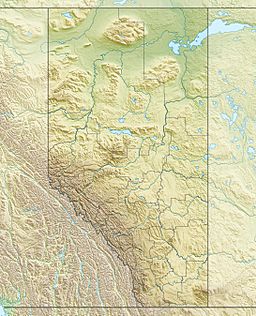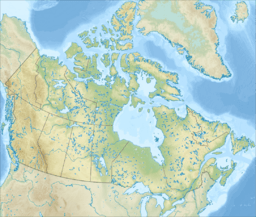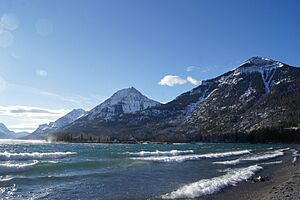Bertha Peak facts for kids
Quick facts for kids Bertha Peak |
|
|---|---|

Bertha Peak, northeast aspect
|
|
| Highest point | |
| Elevation | 2,454 m (8,051 ft) |
| Prominence | 168 m (551 ft) |
| Parent peak | Mount Alderson (2692 m) |
| Listing | Mountains of Alberta |
| Geography | |
| Location | Alberta, Canada |
| Parent range | Clark Range Canadian Rockies |
| Topo map | NTS 82H04 |
| Geology | |
| Age of rock | Cambrian |
| Type of rock | sedimentary rock |
| Climbing | |
| Easiest route | Scramble |
Bertha Peak is a 2,454 meter (8,051 foot) tall mountain. It is found in Waterton Lakes National Park in the Canadian Rockies of Alberta, Canada. This peak sits right behind the town of Waterton.
The closest taller mountain is Mount Alderson, about 2 kilometers (1.2 miles) to the southwest. Bertha Lake is at the southern base of the peak. On the other side of the lake is Mount Richards. To the north of Bertha Peak, you'll find Mount Crandell.
Contents
Mountain's Name: The Story Behind Bertha Peak
Bertha Peak got its name in 1914 from Morrison P. Bridgland. He was a Dominion Land Surveyor who named many mountains in the Canadian Rockies.
The peak is named after Bertha Ekelund (1898–1962). She was an early resident of the Waterton area. The name of the mountain was officially accepted in 1953. This was done by the Geographical Names Board of Canada.
What is Bertha Peak Made Of?
Like other mountains in Waterton Lakes National Park, Bertha Peak is made of sedimentary rock. This type of rock forms from layers of sand, mud, and tiny bits of plants and animals. These layers were laid down over millions of years, from the Precambrian to the Jurassic periods.
This sedimentary rock formed in shallow seas long ago. Later, during an event called the Laramide orogeny, these rocks were pushed up and over younger rocks. This process helped create the amazing mountain shapes we see today.
Weather Around Bertha Peak
Bertha Peak is in a subarctic climate zone. This means it has cold, snowy winters and mild summers. Temperatures can drop very low, sometimes below −20 °C (−4 °F). With the wind, it can feel even colder, below −30 °C (−22 °F).
The snow and rain that fall on Bertha Peak flow into Waterton Lake. From there, the water continues into the Waterton River.
Images for kids
 | Janet Taylor Pickett |
 | Synthia Saint James |
 | Howardena Pindell |
 | Faith Ringgold |






